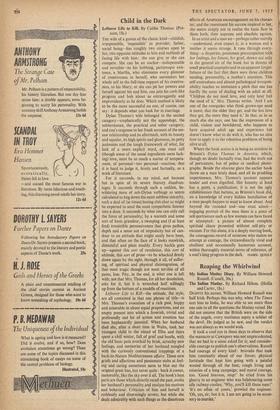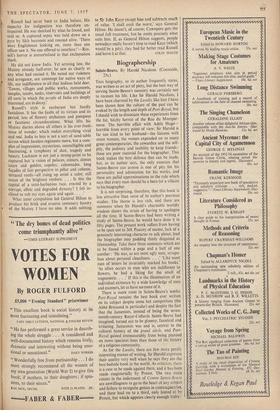Reaping the Whirlwind
The Indian Mutiny. By Richard Hilton. (Hollis and Carter, 18s.) DESPITE his names, William Howard Russell was half Irish. Perhaps this was why, when The Times sent him to India, he was able to see more than one side to all the questions the Mutiny raised. He did not assume that the British were on the side of the angels, every mutinous sepoy a soldier of the devil. He judged as he saw, and the verdict was not always as we would wish.
It took a cool eye in those days to observe that the massacre at Cawnpore was not unprecedented, that we had in a sense asked for it; and consider- able courage to publish one's observations. Russell had courage of every kind : bravado that took him constantly ahead of our forces; physical fortitude that kept him going with a painful wound through all the heat, rough living and miseries of a long campaign; and moral courage, too. 'Good heavens, stop!' he cried from his gharry to an engineer who was belabouring some idle railway-coolies; 'Why, you'll kill those men!' 'It's no affair of yours,' growled the engineer. 'Oh, yes, sir; but it is. I am not going to be acces- sory to murder.'
Russell had never been to India before. His capacity for indignation was therefore un- impaired. He was shocked by what he found, and said so. A captured sepoy was held down on a pyre by Sikh bayonets and roasted alive. 'There were Englishmen looking on, more than one officer saw it. No one offered to interfere ! '—Rus- sell's horror is immortalised in that exclamation mark.
He did not know India. Yet arriving late, the Mutiny already half-over, he saw as clearly as any what had caused it. He noted our rudeness and arrogance, our contempt for native ways of
r life, our indifference to all that Indians held dear. Towns, villages and public works, monuments, temples, tombs, tanks, reservoirs and buildings of all sorts' in which the people of India are deeply interested, are in decay.'
Russell's style is exuberant but hardly fastidious. It has the faults of its virtues and its period, lots of flowery archaisms and pompous or facetious circumlocutions. What lifts his Mutiny diaries above all others is his ever-fresh. sense of wonder, which makes everything vivid and real. India to him is not a sort of sand-table across which faceless regiments move, but a com- plex of impressions, mysterious, unintelligible and fascinating, a symphony of dust, tragedy and beauty. Lucknow is not just a strong-point to be captured but 'a vision of palaces, minars, domes azure and golden, cupolas, colonnades, long facades of fair perspective in pillar and column, terraced roofs—all rising up amid a calm, still ocean of the brightest verdure. . . . Is this the capital of a semi-barbarous race, erected by a corrupt, effete and degraded dynasty? I felt in- clined to rub my eyes again and again. . .
What inner compulsion led General Hilton to produce his brisk and evasive centenary history of the Mutiny I have no idea. It adds nothing
to Sir John Kaye except bias and subtracts much of value. 'I shall omit the worst,' says General Hilton. He doesn't, of course; Cawnpore gets the usual full treatment, but he omits precisely what suits him. lf, as General Hilton suggests, people nowadays really haven't time to read Kaye (which would be a pity), they had far better read Russell



































 Previous page
Previous page